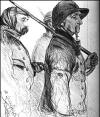|
 After 1850, Mecklenburg had the third highest emigration count in
Europe, superseded only by Ireland and Galicia ( land which is currently
Poland and the Ukraine). Over 261,000 Mecklenburgers left their home country
(the Grand Duchies of Mecklenburg-Schwerin and Mecklenburg-Strelitz)
between 1820 and 1890. Many people, especially those from the lower
social classes, did not have any prospects or future in Mecklenburg
during this period of history. After 1850, Mecklenburg had the third highest emigration count in
Europe, superseded only by Ireland and Galicia ( land which is currently
Poland and the Ukraine). Over 261,000 Mecklenburgers left their home country
(the Grand Duchies of Mecklenburg-Schwerin and Mecklenburg-Strelitz)
between 1820 and 1890. Many people, especially those from the lower
social classes, did not have any prospects or future in Mecklenburg
during this period of history.
Between 1850 and 1890, approximately 146,000 Mecklenburgers emigrated
with most going to the United States but some also
going to South America, Australia, and other countries. Between 1820 and
1890 those going overseas accounted for two thirds of all the emigrants
from Mecklenburg. The defeat of the civil-democratic revolution in
1848/49 and the return of the old social and political problems gave
fresh impetus to this emigration movement.
This loss of population was most prevalent from the so-called flat or
farm land with 88.5 % of all emigrants coming from rural areas. Most of them
came from the manor houses of noble and titled big land-owners. These
were the people who had the most compelling reasons for leaving
Mecklenburg. This was mostly due to the miserable social conditions
caused by the right of establishment rules which existed almost
unchanged between 1820 and 1860.
In 1861, a Mecklenburg historian, Ernst Boll, explained the right of
abode and right of establishment this way: "A Mecklenburger does not
belong to the country as a whole as far as his home is concerned.
Rather, he belongs to the one city or village that he happens to be born
in, or to the city or village where he has received the right of
establishment from the landowner."
 These conditions came about when serfdom was annulled in Mecklenburg
in 1820/21. At that time, many landowners took the opportunity to get
rid of most of their permanent day laborers who were now considered
personally free according to the law. They began to run their lands with
a minimum of permanent workers. The landowners did this so that they
would not have to pay for any laborers who were injured or take care of
them when they grew old. These conditions came about when serfdom was annulled in Mecklenburg
in 1820/21. At that time, many landowners took the opportunity to get
rid of most of their permanent day laborers who were now considered
personally free according to the law. They began to run their lands with
a minimum of permanent workers. The landowners did this so that they
would not have to pay for any laborers who were injured or take care of
them when they grew old.
It was very difficult for day-laborers who were
thrown out to find permanent work elsewhere because a new employer did
not want to give them the "right of establishment" and have to be
responsible for them. The granting of the right to marry also depended
on the granting of the right of establishment, and all subjects needed
permission to marry before they could have a family. A man or woman who
did not have the right of establishment could never start a home. A lot
of people that worked as needed paid laborers were refused the right of
establishment by the ruling class for their whole lives. They were given
only a limited right to residence - only for as long as they had work.
Many Mecklenburgers were, in effect, homeless in their own country.
 Therefore it is no surprise that tens of thousands decided to
emigrate. In fact, the knights and landowners encouraged emigration at
times and the loss of population in rural areas grew larger and larger.
While there still was a population growth of 55,000 people between 1830
and 1850 despite the emigration, new births could not make up for the
high number of emigrants between 1850 and 1905. The rural population
dropped by 25,000. Therefore it is no surprise that tens of thousands decided to
emigrate. In fact, the knights and landowners encouraged emigration at
times and the loss of population in rural areas grew larger and larger.
While there still was a population growth of 55,000 people between 1830
and 1850 despite the emigration, new births could not make up for the
high number of emigrants between 1850 and 1905. The rural population
dropped by 25,000.
After the German Empire was founded in 1871, industrialization spread
and some cities expanded rapidly. The number of people that emigrated
overseas decreased, and internal
 migration increased. More people that
were willing to emigrate went to cities and industrial towns outside of
Mecklenburg, such as the areas of Berlin and Hamburg rather than to
America. In 1900 approximately 224,692 people who were Mecklenburgers by
birth lived outside of their home country. That was almost one third of
the Mecklenburg total population. On December 1, 1900 there were 53,902
emigrants from Mecklenburg-Schwerin living in Hamburg alone. migration increased. More people that
were willing to emigrate went to cities and industrial towns outside of
Mecklenburg, such as the areas of Berlin and Hamburg rather than to
America. In 1900 approximately 224,692 people who were Mecklenburgers by
birth lived outside of their home country. That was almost one third of
the Mecklenburg total population. On December 1, 1900 there were 53,902
emigrants from Mecklenburg-Schwerin living in Hamburg alone. |

